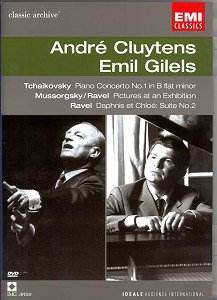Although this DVD is programmed as a concert
with a solo encore after the concerto, the performances come from
different dates and locations. The two French locations were used
within a year of each other, and the encore was recorded in England
before either of the orchestral items. The film quality is good,
albeit in black and white, and the sound is reasonable quality
mono. What the items are notable for is that they bring together
one of the world’s greatest pianists with an underrated (especially
in the UK) conductor, who was absolutely first class as an accompanist,
and who specialised in Franco–Russian repertoire.
The concert starts off with the second suite
from Daphnis et Chloé, and the conductor’s understanding
of Ravel’s complex colours is abundantly clear. His sense of internal
balance of the orchestra is unerring, and although his pacing
of the central Pantomime section is very steady, he allows his
flute soloist enough leeway for the section to be tender and very
moving.
The Mussorgsky is accorded a very good performance;
not hwever in the upper echelons, mainly because of the restrictions
of the sound, and the less than first class playing of the orchestra.
The ORTF Orchestra was not the ensemble in 1958 that it has become
today, so beware of braying horns in the proper French style and
rather raw woodwinds. It is not quite as bad as the contemporary
Paris Conservatoire Orchestra but certainly not in the Berlin
Philharmonic style.
The main item on this DVD is the first Piano
Concerto of Tchaikovsky, played mesmerisingly by Emil Gilels.
This was recorded at the time of slight relaxation of travelling
restrictions on Soviet artists. In the piano field, Sviatoslav
Richter was the more popular artist at the time, and therefore
there is less video material of his compatriot in action. We are
therefore lucky to be able to watch Gilels play what became almost
a party piece (He recorded the concerto in the west with Reiner,
Mehta and Maazel) as well as records of it made in the Soviet
Union. His style is mesmerising, and this inspires both conductor
and orchestra to put their whole body and soul into the accompaniment.
I found when watching this item that I was sitting on the edge
of my seat so I can confirm the effect of Gilels’ standard of
playing. Exhilarating!
We return to a BBC studio for the encore: a superb
performance of Prokofiev’s third piano sonata. The composer’s
writing is assured and Gilels performance of it is in the same
class as that for the Concerto preceding it. The BBC studio recording,
done at a celebrity recital in 1959 is up to normal BBC standards
and can be recommended without reservation, except for the lack
of colour. This is a case however where the monochrome picture
becomes a non-issue once the performances get under way. This
is the stamp of greatness. As usual with this series, notes are
concise, but comprehensive. Session photographs of the artists
complement the issue. Recommended.
John Phillips
